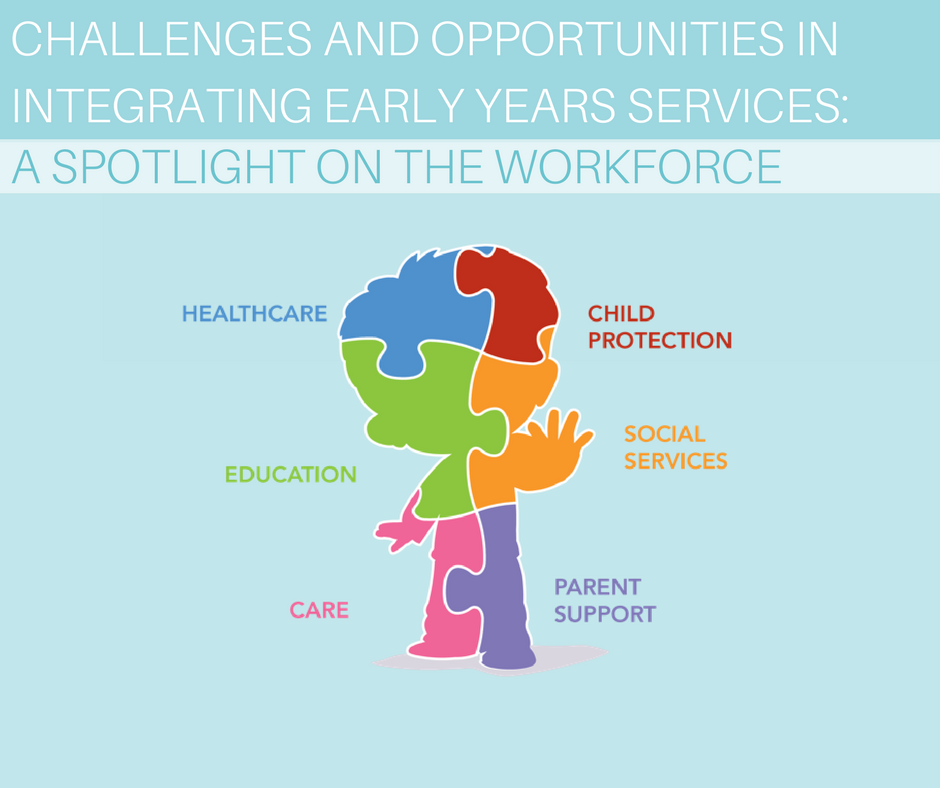"Health, education, a safe and stimulating environment at home and in public spaces...none of these is more important than the other." - Mihaela Ionescu, Program Director at ISSA
Opportunities in integrating early years services
We know that integrated early childhood systems help children and their families, particularly the most vulnerable. They benefit from a "one-stop-shop" approach, through which the widest possible range of agencies and services are able to meet their needs either directly or through referral.
They also have benefits for the personnel working with young children. By offering the workforce opportunities to work across professions, the quality of staff practice is improved immensely. When centers are integrated, expertise can be shared across sectors (between health workers and teachers, for example) and work in both sectors can be boosted.
One U.S. study investigated joint working between mental health professionals, daycare, and pre-school staff found that collaboration made teachers more empathetic and interested in the deeper meaning of behavioral problems. These teachers had a greater level of control over, and responsibility for, behavior in their classroom. Training in integrated practice also allows staff from multiple sectors to develop a common way of working, and it enhances the efficiency and cost-effectiveness of service delivery.
In short, integrated systems help practitioners, managers and policymakers accomplish more together – all the while keeping the child at the center of their work. As those working in the field will tell you, this is what we’re after.
The road to integrating services…
INTESYS is a three-year project funded by the European Commission’s Erasmus+ Programme. A consortium of partners – Aga Khan Foundation, Compagnia San Paolo, Emanuela Zancan Foundation, Calouste Gulbekian Foundation, ISSA, Learning for Well-Being Foundation, Pedagoski Institut and Centre for Innovation in the Early Years – focuses on piloting new approaches to Early Childhood Education and Care (ECEC) systems in Europe. These pilots aim to ensure children and families in vulnerable situations have access to high-quality ECEC provided by services that are better integrated across sectors and professions.
It isn’t always easy. Even the terminology is not as straightforward as one may hope. Petra Bozovičar of Step By Step Center for Quality in Education mentions a question that arose when describing integrated systems to staff members working on the pilot – it is a question that many of us may have.
“If we call each other when there is a problem that we need to solve- is this not an integrated system?”
Representatives of another pilot plainly state just how difficult the road to integration can be:
Sometimes progress is made, other times you get stuck in reverse. It has become quite clear that cooperation and integration needs strong leadership, a driving force to keep partners motivated.
And, that is just what the INTESYS project is about – cooperation. Through the INTESYS project, a consortium is working together to create a toolkit for Integrated Services. This toolkit is meant to promote integration among different sectors, using the ECEC services as an entry point for integration. The approach takes into account the participation of communities, parents and civil society actors in shaping the integration of services. The Toolkit is promoting the importance of quality in integrated services and is opening the space for dialogue among different stakeholders in the early childhood system.
As a finalization of the INTESYS Toolkit is underway, many representatives of pilot projects have been articulating its success, and just how far they’ve come. One pilot explains:
We came to know each other better and connect with each other, which opened the way for new tasks and also contributed to solving current problems. Together we are stronger and more efficient in finding ways to the common goal.
Where can you learn more…
While we await the final toolkit, the draft can be found here.
You can also hear more about the barriers to making this approach work, the crucial role of the workforce and the leadership and the opportunities that it can create for the outcomes of young children listen to the webinar "Challenges and opportunities in integrating early years services: a spotlight on the workforce."
Or, read this interview with, ISSA’s Program Director, Mihaela Ionescu where she discusses the need for multi-sectorial, integrated interventions that enable nurturing environments and adopt an individual-child and family perspective.
Did you find this interesting? Sign-up for our newsletter to receive updates about new resources and join the conversation about the early childhood workforce on Twitter.


